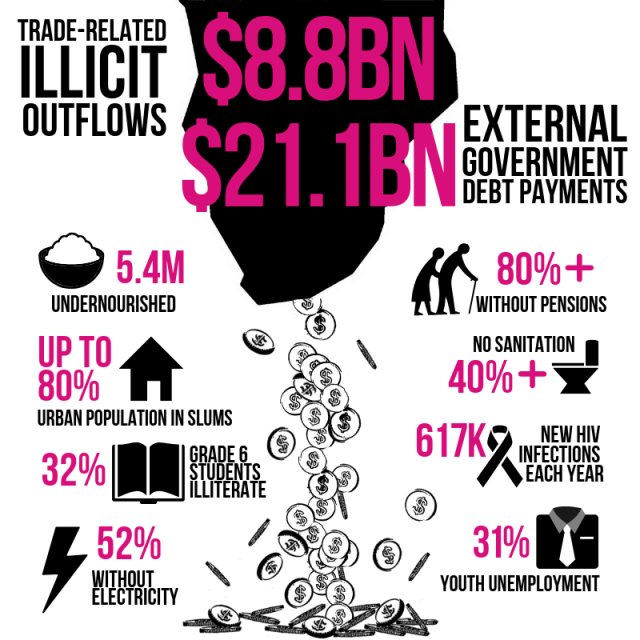Two reports that really stood out for me last year were Honest Accounts? (by a group of African and UK NGOs) and The State of Finance for Developing Countries, 2014 (by Eurodad). Both reports represent highly impressive attempts to calculate and compare the resources flowing in and out of Africa (the former report) and ‘developing’ countries (the latter one). What are their headline findings? Africa faces a net annual loss of $58.2 billion. And ‘developing’ countries have lost more than double the financial resources that they have received as new inflows since the financial crisis.
While different elements of these reports may be debated, it is clear that they contribute to efforts to put aid into proper context. Unfortunately, most Northern civil society organisations (CSOs) working on global poverty seem to measure their government’s concern for poor people according to the size of its aid budget. Such a mindset is tricky to change. In part, this is because many of these groups financially benefit from aid, or at least aspire to obtain official funding (my previous blog engages with this issue). Beyond this self-interest, I think they possess a general aversion to complex stories (even when talking about aid, the vast majority of CSOs focus on its quantity rather than the more intricate yet important issue of its quality).
Another complex story is that of internal politics in countries of the Global South (which in most cases, it is worth noting, has been shaped by colonialism). In my view, the nature of domestic political systems, and in particular the ways in which formal and informal institutions function, is central to the existence of widespread absolute poverty in these countries. Many have made this argument, particularly in regard to Africa, but perhaps none as powerfully as Matthew Lockwood in his landmark book The State They’re In.
I think that this view is one that many working on global poverty issues in the UK (and in the Global North more generally) find difficult to accept. In part this is due to it being a complex story, but also because such an understanding means recognising that we’re not the main actors in this struggle. While actors based in the Global North can do many useful things to help, it is their counterparts in the Global South that have the most prominent role to play in overcoming poverty.
If this reality is accepted, however, then Northern civil society can properly prioritise its areas of focus. Two key areas emerge from the preceding analysis: supporting local efforts for just and effective governance, and addressing the truly important issues that Northern governments have power over. Whatever else CSOs may work on, these two key areas should be considered cross-cutting priorities.
Any activities to help improve governance must be realistic. Avoiding the imposition of ‘best practices’ that do not fit particular contexts and are not considered relevant by local actors (both those implementing reforms and those supposed to be benefiting from them) is crucial. Similarly, as an IDS study argues, facilitating the efforts of our allies and partners to influence the interests and incentives of powerful domestic actors may be important before more ambitious reforms are attempted. In everything that we do, we must listen to the poor, particularly the most vulnerable amongst them, and build their capacities and encourage them to be critical.
Aid can obviously be one source of resources to enable this work. However, if aid is to achieve even its limited potential, major changes are necessary. The aid effectiveness agenda is only a starting point. Uncomfortable yet important threats such as aid potentially contributing to a new debt crisis, as well as it being a vehicle for (undemocratic and often damaging) economic policy conditionality, must be confronted. Going further still, the entire aid system needs to be made relevant to the 21st century (‘Aid 2.0’), and ways of working need to embrace experimentation, learning and adaptation.
At the same time, Northern actors are very restricted in the extent to which they can positively shape governance in the Global South. Northern CSOs have far more ability to influence those issues over which their own governments wield genuine power. If they truly care about overcoming global poverty, CSOs in the Global North should prioritise working on such issues based on their importance. The research by the group of African and UK NGOs and Eurodad points to the way forwards: far more resources need to be dedicated to campaigning on issues such as illicit financial flows compared to aid (to this I’d add issues such as trade where potential gains/losses are enormous compared to aid).
Achieving agreement at the UN on a strong and legitimate post-2015 development agenda is undoubtedly crucial. But even winning that battle won’t dampen the necessity of confronting and transforming dominant narratives around poverty and development. If we in Northern civil society are to rise to this challenge, I believe that, in addition to ending our obsession with receiving aid funding, it is essential to embrace complexity and address our inflated sense of self-importance.









